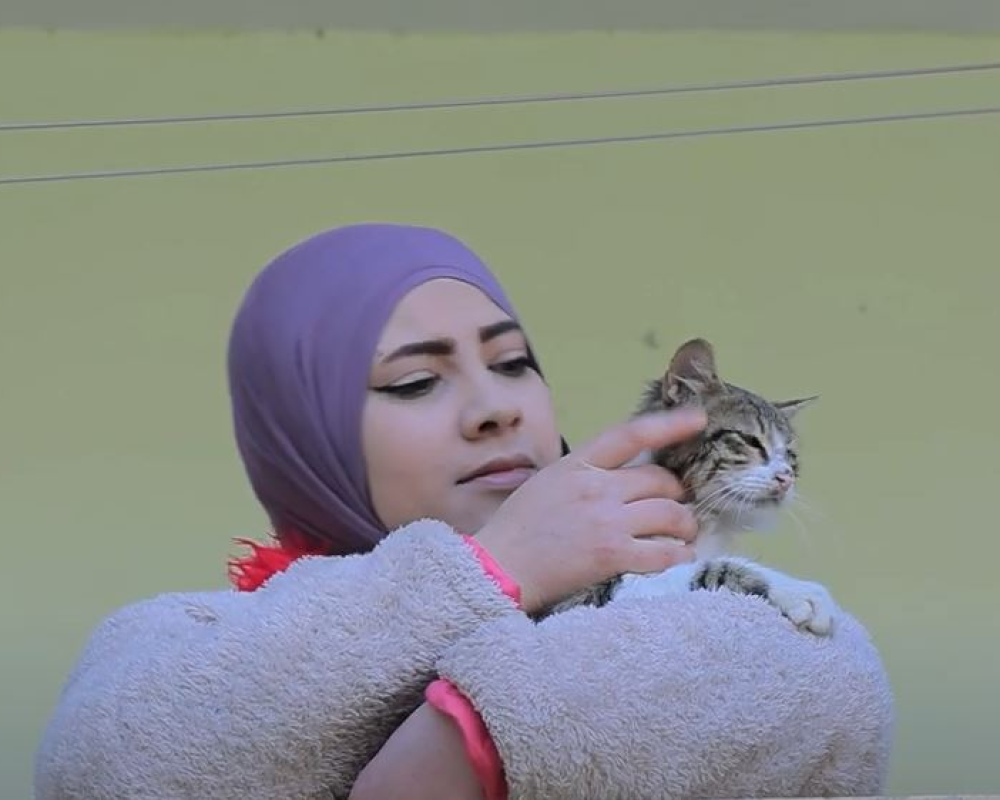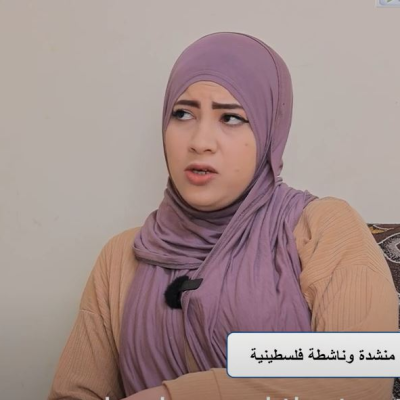
Bethlehem / PNN /
Released Palestinian Prisoner Highlights Cultural Resistance Through Songs
Hanin Al-Masaeed, a recently released prisoner as part of the ongoing prisoner exchange deal in the Gaza Strip war, emphasized the significance of patriotic songs, national writing, and social media as expressions of Palestinian cultural identity and nationalism that she will continue to engage in.
Al-Masaeed, a resident of Aida refugee camp, expressed that she used to perform patriotic songs before her arrest. She was charged with incitement against prisoners, only fully understanding their plight once she experienced it herself. Describing prison life as extremely challenging, especially after spending eighteen days in occupation prisons, she wondered how those sentenced to a lifetime cope.
Regarding her arrest and detention experience, Al-Masaeed recounted the Israeli forces' brutal raid on her home on October 11. They raided her house violently, gathered her family, confiscated her mobile phone, and informed her of an arrest order. She did not anticipate being arrested and initially thought the raid was a routine inspection. However, to her surprise, she was informed of an arrest warrant issued in her name.
Reflecting on her transfer to the detention facility, Al-Masaeed said they were placed in an Israeli police car, accompanied by a soldier who played loud Hebrew songs on her phone, covering her ears as a form of psychological torture. They also placed adhesive tape over her eyes, which she found particularly challenging. Although she wanted to cry, she refrained, determined to remain strong in front of her captors.
Former Palestinian Prisoner Highlights Harsh Conditions and Cultural Resistance in Israeli Detention
Afterward, they took me to a detention center in a prison called Sharon, a four-day detention that proved to be one of the toughest prisons. The female prison guards would beat the female prisoners and confiscate our blankets and sheets at six in the morning. We were provided with only one meal a day, and the treatment of the female prisoners was extremely brutal; they showed no respect. After the four days passed, they transferred us in a "bus" (prisoner transport vehicle) to Damon prison, where all the female prisoners were held.
"I used to sing in prison, lightening the mood for the other prisoners when we sang together. Singing was my companion in prison, and this, in addition to being a writer, made the experience more bearable. I wrote inside the prison and sang. However, this did not ease the difficulty much because the prison conditions were extremely harsh," she explained.
She further clarified that each new prisoner would initially cry due to the new experience, stating, "I wrote a post on Facebook, as we continue to share our lives online. However, after the war, they implemented a policy of silencing everyone. They brought in prisoners aged from 70 to 15 years old, showing no distinction between the elderly, young girls, and young women. Their treatment was very harsh."

Regarding the reason for her arrest and the charges brought by the occupation, Al-Masaeed explained that she used to sing and write thoughts on social media. The interrogators accused her of incitement, a charge she found surprising. Alongside other female prisoners, she was accused of incitement through social media. Despite her arrest by Israel, she emphasized that it would not prevent her from singing and writing, as these are fundamental human rights.
Reflecting on her liberation and how she became aware of it during the "Flood of Al-Aqsa" deal, Al-Masaeed said that she and all the female prisoners expected to be released from the early days of the war. They hoped for release in an exchange deal but did not anticipate being released as part of the "Flood of Al-Aqsa" deal. She noted that they were treated with great severity and cruelty by the female guards and prison administration, even more than the older female prisoners. However, as the older prisoners began to be released in the initial batches of the deal, they gained hope of being released themselves.
Hanin Al-Masaeed Reflects on Freedom and Commitment to Homeland
Hanin Al-Masaeed concludes her account by expressing that she only felt true freedom when she entered prison and was subsequently liberated. She stated, "Freedom is in prison. Those who claim that they imprison you for silencing you, on the contrary, prison is freedom. Prison is for the free. In my view, and by God, prison is for the free."
She added, "Cowardly is the one who grasps the idea and abandons it. It's impossible. Ask any male or female prisoner: would you abandon your principles or stop talking about the homeland in general? They will answer no because I was imprisoned for the homeland. How can I abandon it and remain silent?"

"This story is produced with the support of the 'Qarib' program, implemented by the French Media Development Agency (CFI) and funded by the French Development Agency (AFD)."